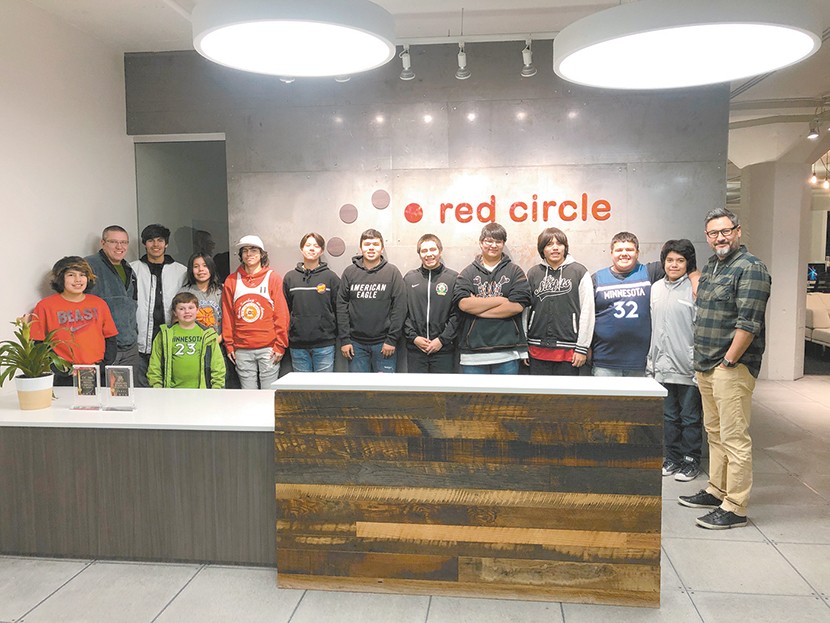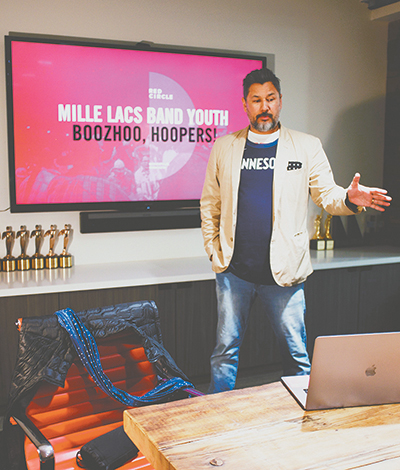
By Chad Germann Mille Lacs Band Member
On Saturday, February 24, a dozen young Ojibwe men, basketball players age 12 to 17, traveled from the Mille Lacs Reservation to visit my company’s downtown Minneapolis offices and attend a Timberwolves game together.
This event came about because Joe and Chris Nayquonabe believed I could serve as a positive role model to these young basketball players. It was nice and sweet of them, Joe and Chris, to think that of me. As Commissioner of Corporate Ventures and Director of Onamia Indian Education, they are strong role models in their own right.
It was also nice of the boys to humor me by listening to my story, which I was happy to tell, because I know from my own life that having good role models is crucial to our healthy development as human beings — and specifically as Anishinaabe men.
Charles Barkley, one of my sports heroes, famously once said, "I’m not a role-model," which I always thought was a silly thing to say. People look up to and admire whomever they choose! Could be a dad or mom, or older sibling, or a famous athlete, or a Kardashian, or the older cool kid at school. It’s their choice, and even if Charles doesn’t want to be one, he is. That’s how growing up works.
Kids look at others for clues and model their behavior according to what they see and learn from others, which is something I think we all should keep in front of us: Our kids will follow and emulate the behaviors of those they admire, and they will choose their role models from the options available. Having good options for our kids is important.
When I was young, I had several good, positive role models in my life. My dad and mom, both truly amazing human beings, were the most influential. My high school basketball coaches were others. 
But one who stands out is my older cousin Rick Dunkley. Rick is a Mille Lacs Band member, like me, and when we were young our families were very close. We spent a lot of time together. Rick was charming, popular, a straight-A student, and a terrific high school athlete. And when I was young I wanted nothing more than to play ball with my older cousin Rick and his buddies. Baseball, football, basketball — I didn’t care. Whether we were playing together in the backyard, or I was watching him play town-team ball on a Saturday night at Brennan Field in Hinckley, I just wanted to be around him. Rick was just so damned good at everything, but especially sports. Everyone looked up to him, everyone wanted to be on Rick’s team in whatever sport we were playing, and I followed along behind him every chance I got, hoping to be picked on his team.
I’m an adult now, 46 years old, and I’ve thought a lot about how I arrived at the place I’m at now. All those years following along behind Rick — wanting so badly to play ball alongside him, to be captain of the varsity basketball team, to be the guy whose picture is in the local town paper, to be a good student so I could go to college like Rick — all of this ’wanting to be’ is what made me become the person I am today. And whatever success I can claim to have, much of it can be credited to Rick, to my parents, to my first/best basketball coaches.
The physics of it are so very simple: Close proximity to positive role models, like my cousin Rick — a successful student athlete, a positive role model — pulled me in the direction of success, created a path for me to become a successful student athlete in my own right.
So when Joe and Chris reached out to ask me if I would talk to some young Band member basketball players, to stand in front of them for an evening and be a role model for them, I was happy to do it. Because I know how influential a positive role model can be for a young person. I owe so very much to mine that — damn right — I’m going to try and give some back.